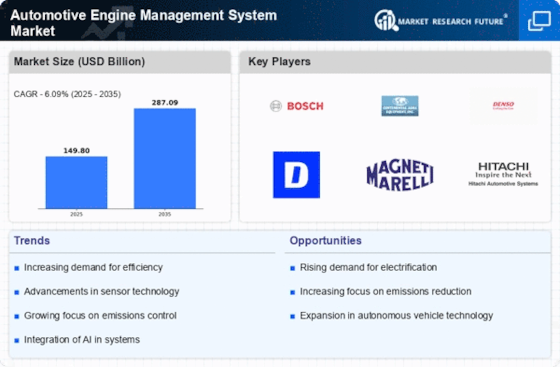Market Trends
Key Emerging Trends in the Automotive Engine Management System Market
The dynamic landscape of urbanization presents a simultaneous surge in urban density and traffic-related challenges. As cities expand to accommodate growing populations, the intertwining issues of congestion and efficient urban management become increasingly pronounced. In response to these challenges, the adoption of Passenger Information Systems (PIS) emerges as a transformative and smarter approach, offering solutions to mitigate traffic congestion and pave the way for intelligent transport systems in the years to come.
The symbiotic relationship between urban density and traffic issues is undeniable. As more people flock to cities in search of opportunities and a higher quality of life, the urban landscape undergoes a metamorphosis, resulting in increased congestion on roads and public transit systems. To effectively manage this urbanization and address the associated traffic woes, a strategic and technologically advanced solution is imperative. This is where Passenger Information Systems step into the spotlight, providing a holistic approach to urban mobility challenges.
Traffic congestion stands out as a pressing problem that plagues urban areas globally. The traditional methods of managing traffic, such as expanding road networks, often fall short in keeping pace with the rapid urbanization. Passenger Information Systems offer a smarter alternative by leveraging technology to optimize transportation systems, providing real-time information to commuters, and enhancing overall traffic management.
One of the key contributions of Passenger Information Systems is their ability to alleviate the challenges posed by traffic congestion. By offering commuters real-time updates on routes, delays, and alternative transportation options, these systems empower individuals to make informed decisions, leading to more efficient use of transportation infrastructure. For example, dynamic route information provided by advanced PIS helps commuters choose less congested paths, reducing overall traffic congestion and minimizing travel times.
The significance of advanced Passenger Information Systems goes beyond merely mitigating congestion; they also serve as invaluable tools for managing transportation issues and laying the groundwork for intelligent transport systems. The data generated by these systems provides a wealth of information that can be harnessed to analyze traffic patterns, identify bottlenecks, and formulate strategic plans for urban mobility. This data-driven approach is crucial for developing intelligent transport systems that are adaptive, responsive, and capable of meeting the evolving needs of urban populations.
The integration of advanced technologies, such as Artificial Intelligence (AI) and data analytics, enhances the capabilities of Passenger Information Systems. AI algorithms can process vast amounts of data in real-time, providing actionable insights for transportation authorities. This not only enables efficient traffic management but also facilitates predictive analysis, allowing authorities to proactively address potential issues before they escalate.
Moreover, as cities evolve into smart urban ecosystems, Passenger Information Systems play a pivotal role in shaping the future of transportation. Smart cities leverage data and technology to optimize various aspects of urban life, and transportation is a key focus area. Advanced PIS contributes to the creation of intelligent transport systems within smart cities, fostering a seamless and interconnected network of transportation modes that cater to the diverse needs of urban dwellers.
The synergy between increasing urbanization and the rising demand for efficient public transit is a driving force behind the growth of the Passenger Information System market. As more people rely on public transportation for their daily commutes, the need for intelligent systems that enhance the efficiency and reliability of these services becomes paramount. Passenger Information Systems not only address the challenges posed by urban density and traffic congestion but also contribute to creating a more sustainable and user-friendly public transportation experience.
In conclusion, the escalating urbanization and the associated surge in traffic-related challenges necessitate a paradigm shift in how cities approach transportation management. Passenger Information Systems emerge as a beacon of innovation and efficiency, providing solutions to alleviate traffic congestion, enhance urban mobility, and pave the way for intelligent transport systems. As cities continue to evolve, the role of advanced PIS in shaping the future of urban transportation becomes increasingly crucial, offering a smarter and more sustainable approach to navigate the complexities of modern urban living.


















Leave a Comment